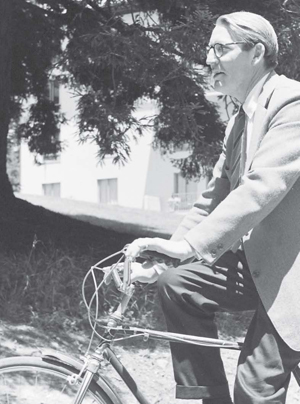Campus News
Preparing for UC Santa Cruz’s 50th
This fifth installment in our series of stories leading up to a celebration of UC Santa Cruz’s 50th anniversary in 2015 is about Page Smith, the first provost of Cowell College, whose unconventional approach set the tone for a rigorous and free-flowing education.




Editor’s note: This fifth installment in our series of stories leading up to a celebration of UC Santa Cruz’s 50th anniversary in 2015 is about Page Smith, the first provost of Cowell College, whose unconventional approach set the tone for a rigorous and free-flowing education.
In 1964, Page Smith walked onto the fledgling UC Santa Cruz campus, his slight limp a reminder of the wounds he suffered when he tripped a stake mine in Italy as an Army captain during WWII.
He was a tall man with a face that lay on the border between rugged and distinguished, a Maryland-born historian whose two-volume biography of John Adams had recently won a Bancroft Prize. But Smith, then 47, wasn’t at the new campus to enhance his rising reputation. Instead, the former UCLA professor and newly hired first provost of Cowell College had come to shake up what he saw as a boring, factory-like system of education.
In the next five years, the Harvard-educated Smith would do just that. He would not only help hire a fiery collection of thought-provoking pioneer faculty but would lead the charge to dump letter grades in favor of narrative evaluations, set a model for the campus’s core courses, and bring a heady mix of artists, activists, and thinkers to campus to teach and mingle with students.
The man who sometimes fired a musket during his history classes and wrote books on subjects as diverse as Thomas Jefferson and the importance of chickens saw UC Santa Cruz as an opportunity to innovate, to make learning exciting again.
“What Page and (his wife) Eloise started together was the idea that you educate the whole person,” said Faye Crosby, current Cowell College provost. “You don’t drive into the big parking lot of knowledge, fill up your brain, and drive away. You are part of an intellectual community. You are in the pursuit of truth in the company of friends.”
Stories about Smith’s early years at UC Santa Cruz abound: The white horse he rode around campus, the letter he wrote taking students to task for going barefoot, wearing raunchy clothes, and having too much sex—a missive that became the subject of a TIME magazine article.
But it was Smith’s progressive ideas about the nature of a rigorous and free-flowing education and his love for students that became legend at UC Santa Cruz.
It was Smith who set up weekly College Nights where faculty and students attended a formal dinner followed by mind-blowing speakers like the radical Harvard theologian Harvey Cox, writer/activist Susan Sontag, and neurologist Oliver Sacks. It was Smith who invited artists like Noah Purifoy, co-founder of the Watts Towers Art Center, and Ruth Asawa, a Japanese-American sculptress and activist, to lead seminars on campus. And it was Smith who conceived Cowell’s two-year World Civilization core course, taught by Professors William Hitchcock and Mary Holmes.
He nettled the UC system by leading the charge to get rid of letter grades which, according to his posthumously published oral history, he thought, “produced a competitive situation where some people prospered at the expense of others,” and he also rankled some for his admittedly “wretched” administrative style that left people waiting at his messy desk while he wandered the campus talking to students and faculty about campus needs.
But what many from the pioneer years at UC Santa Cruz remember most was the way he and his artistwife, Eloise, threw open their doors and hearts to the UC Santa Cruz community—counseling students through personal problems, inviting them into their home, and making it a point to learn about each student’s interests and dreams.
“No matter who you were, no matter what your background,” said Bill Dickinson (Cowell ’68, philosophy), “they behaved as though you had nobility in you. And they made it abundantly clear that they, and the college community, stood ready to draw it out.”
Smith, who believed the first five or six years of a new venture were the most ripe for change, left the provost’s post in 1969 but continued to teach. In 1973, he resigned in protest of a decision to deny tenure to his friend and colleague, Assistant Professor of Religious Studies Paul Lee—a decision he saw as putting publishing above the important talent of teaching students.
Smith retired with his beloved Eloise to his Bonny Doon ranch where he wrote eight more books, including the eight-volume A People’s History of the United States, pursued social justice issues, and raised a menagerie of farm animals, including a flock of 100 chickens.
Smith died of leukemia on Aug. 28, 1995—thirty-six hours after Eloise succumbed to kidney cancer. He was 77. “When mother died, he (Smith) was having chemotherapy,” his daughter Anne Easley recalled. “He just pulled the lines out right there.” By the next afternoon, he was in a coma and, surrounded by family, he died that night.
“One of the last things he said was, ‘Give my best to everyone at Cowell,’” Easley said.
“Celebrating the Smiths: Their Legacies at Cowell College and Beyond,” will be held from 9 a.m. to 6 p.m. Jan. 31, 2015. For more information, contact the Cowell College provost’s office at (831) 459-2251 or cwprvsta@ucsc.edu.